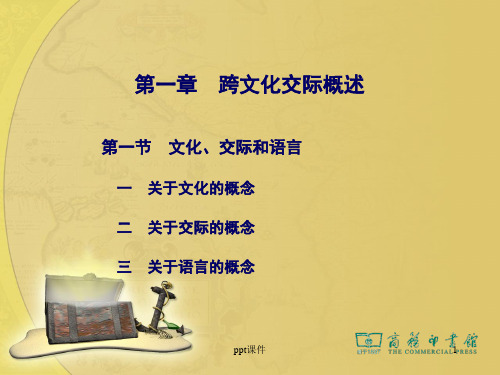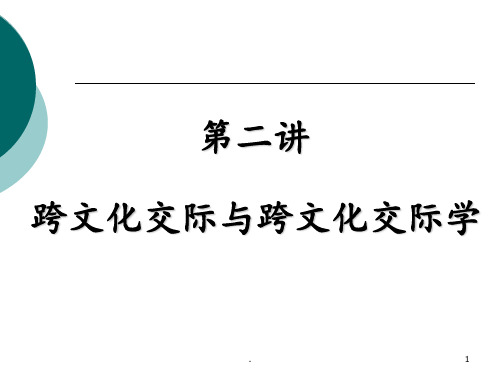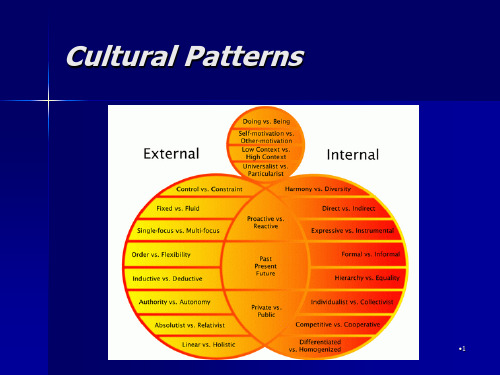跨文化交际PPT
合集下载
cultural-diversity-跨文化交际PPT课件

Kluckhohn and Strodtbeck’s Hofstede’s Dimensions Edward T Hall’s
Value Orientation
of Cultural Variability
Context - Culture Theory
Human Nature Man-nature
(10 mins)
.
17
2. Model by G. Hofstede (1984)
▪ Hofstede’s work was one of the earliest attempts to use extensive statistical data to examine cultural values.
rules and guideposts)
.
6
Why is one culture different from
another?
More deeply
▪ World view (religion)
- Spiritual and psychological needs of people (life and death, creation of universe, relationship between humans and nature)
1) = Human nature orientation 人性取向
2) = Man-nature orientation 人天取向
3) = Time orientation
时间取向
4) = Activity orientation
行为取向
5) = Social orientation
. 人际取向
《跨文化交际》课件

跨国企业的跨文化团队建设案例
总结词
跨国企业通过跨文化团队建设,实现文化融合与协同发展。
详细描述
某跨国企业为应对不同国家和地区的文化和市场差异,组建了由不同国籍员工组成的跨文化团队。通过培训、交 流活动等方式,促进员工之间的文化了解与合作,实现了企业业务的快速发展。
国际旅游中的跨文化冲突解决案例
总结词
教师需要关注学生的文化背景和个性特点,采用多样化 的教学方法和手段,促进学生的学习和发展。
教育机构需要提供跨文化交际的培训和教育,帮助学生 和教师了解不同文化的特点和差异。
教育中的跨文化交际有助于培养具有国际视野和跨文化 交际能力的人才,推动全球化和文化交流。
国际关系中的跨文化交际
01
国际关系中的跨文化交际是指在不同国家之间进行有效的沟通和合作 。
THቤተ መጻሕፍቲ ባይዱNKS
感谢观看
02
CATALOGUE
文化差异的表现
语言差异
语言差异是跨文化交际中最为直观的表现。不同文化背景的 人们使用不同的语言,这可能导致沟通障碍。例如,某些词 汇在一种文化中可能有特定的含义,而在另一种文化中可能 没有。
语言使用的习惯和规则也因文化而异,如敬语的使用、礼貌 的表达方式等。了解和尊重这些差异是进行有效跨文化交际 的关键。
详细描述
某高校开展国际交流项目,邀请不同国家和地区的留学生和学者参与学术交流、文化体 验等活动。通过这些项目,学生和学者增进了对不同文化的了解,促进了国际合作与友
谊。
国际组织中的跨文化沟通案例
总结词
国际组织中的跨文化沟通,推动全球议题的 解决。
详细描述
某国际组织在处理全球性议题时,注重跨文 化沟通与合作。组织成员来自不同国家和地 区,拥有不同的文化背景和观念。通过有效 的跨文化沟通,成员们达成共识,推动了全 球性议题的解决。
《跨文化交际》课件

2
基本规则
了解跨文化交际的基本规则,如注重非语言沟通、避免使用俚语和难懂的语言等方的文化背景和习惯,调整沟通策略,确保信息的准确传达。
解决跨文化交际中的问题
1 展示文化敏感性
在跨文化交际中,需要对不同文化背景的人 表示尊重和理解。
2 调整沟通策略
针对跨文化交际中遇到的问题,我们可以根 据对方的习惯和背景,调整沟通策略,解决 问题。
案例研究
跨文化交际成功案例
一位跨国公司的领导成功地进行了跨文化沟通,在 不同国家的员工中建立了良好的合作关系。
跨文化交际失败案例
因为文化差异,一个国际项目中的交流出现了误解 导致该项目未能按时完成。
总结与讨论
反思课程内容
通过本课程的学习,您是否更好地了解了跨文化交际的重要性和技巧?
提出问题和建议
《跨文化交际》PPT课件
本课程旨在帮助您更好地了解跨文化交际的重要性和技巧,并掌握如何有效 地与不同文化背景的人交流。
什么是跨文化交际?
定义
跨文化交际是指在跨越不同文化背景的情况下进行的交流和互动。
重要性
随着全球化进程的加快,跨文化交际的重要性越来越受到重视。
挑战
不同文化之间的交流可能会面临很多挑战和障碍,需要我们采取有效的沟通策略。
在跨文化交际的实践中,您是否遇到了问题?为了更好地提高跨文化交际的能力,您有什么 建议?
文化差异
不同的文化特征
每个文化都有自己独特的特征,例如语言、信仰、 价值观和习俗。
文化差异的影响
文化差异可能会影响人们的观念、行为和与他人的 交流方式。
文化融合
跨文化交际也是文化融合的过程,可以促进不同文 化之间的理解和尊重。
跨文化沟通技巧
《跨文化交际》课件

尊重他人
尊重和接受不同文化的观点 和做法。
发展人际关系
建立良好的人际关系有助于 跨文化交际的顺利进行。
结论和总结
跨文化交际是一个复杂而有趣的领域,它可以丰富我们的视野,增进人与人之间的理解和合作。在全球化的时 代,跨文化交际的重要性不可忽视。
自由民主
西方社会价值观的核心之一,强调个人自由和人权。
摇滚音乐
西方音乐文化的代表,让人们释放情感和表达自我。
跨文化交际的概念
跨文化交际是指不同文化背景的人之间进行有效沟通和交流的过程。
跨文化交际的重要性
1 提高理解力
通过跨文化交际,我们能够更好地理解和尊重他人的文化。
2 促进合作
跨文化交际有助于不同文化背景的人们共同合作解决问题。
《跨文化交际》PPT课件
跨文化交际是研究不同文化间的交流,了解和尊重不同文化背景的重要性。
中国文化
长城
茶道
中国古代的伟大建筑物,象征着 中国的辉煌历史和文化的丰富性。
中国独特的文化艺术,展示了对 礼仪和和谐的追求。
书法
中国的艺术形式,以笔刷和墨水 书写汉字,传承了上千年的历史。
西方文化
圣诞节
西方重要的节日,在这一天人们庆祝和分享快乐。
3 推动创新
不同文化间的交流和碰撞能够激发创新思维,产生新的想法和解决方案。
跨文化交际中的挑战
1
语言障碍
不同语言之间的差异可能导致交流困难。
2
文化差异
不同文化的价值观和习俗可能造成误解和冲突。
3
沟通风格
跨文化交际中的沟通方式和风格可能不同,需要灵活适应。
跨文化助于更好 地交流和理解。
跨文化交际概述课件

04
跨文化交际在全球化时代 的意义与价值
促进国际合作与交流
增进国际间的了解和友谊
通过跨文化交际,人们可以了解其他国家和文化,进而促进国际 间的合作和友谊。
促进国际商务谈判
在全球化时代,国际商务谈判中涉及不同文化和背景的人员,跨文 化交际能力能够有效地促进谈判进程。
推动国际援助和合作
在应对全球性问题如气候变化、疫情等事件中,跨文化交际能够帮 助不同国家之间建立合作,共同应对挑战。
案例三
一家中国公司与一家法国公司的合作项目,由于语言、文化和商业习惯的差异,双方在谈 判中遇到了困难。经过长时间的沟通和协商,双方最终达成了共识,并成功完成了合作项 目。
跨文化交际实践经验分享
经验一
尊重对方的文化和习惯,不要轻易评价和批评。在沟通中要注意细 节和礼仪,避免冒犯对方。
经验二
学习并掌握对方的语言和文化背景知识,以便更好地理解和沟通。 在沟通中要使用正确的语言和表达方式,避免歧义和误解。
经验三
保持开放的心态和积极的态度,决方案。
跨文化交际失败案例反思与总结
案例一
一位中国员工在与一位美国同事沟通时,由于语言和文化 差异,产生了误解和冲突。双方没有及时沟通和解决,导 致关系恶化。
案例二
一家中国公司与一家德国公司的合作项目,由于文化差异 和商业习惯的不同,双方在合作中出现了很多矛盾。最终 合作失败,双方都遭受了损失。
语言障碍与沟通障碍
1 2 3
语言障碍
不同语言之间的交流障碍是跨文化交际中的常见 问题,这可能导致误解和沟通困难。
非语言沟通差异
不同文化背景的人可能使用不同的非语言沟通方 式,如肢体语言、面部表情等,这可能导致误解 和沟通困难。
跨文化交际概论 ppt课件

ppt课件
3
第一章 跨文化交际概述
第一节 文化、交际和语言
在文化学或文化人类学中,“文化”一词通常指 人类社会区别于其他动物的全部活动方式以及活动的 产品。就这一概念的核心内涵而言,它的意义是明确 的。然而专家们给“文化”所下的定义可以说各有千 秋。在众多的关于文化的定义中,文化人类学家泰勒 (Tylor)和马林诺夫斯基(Malinowski)的定义比较 受人推崇。前者着眼于文化的整合性和精神性,后者 着眼于文化的功能性和制度性。
ppt课件
9
第一章 跨文化交际概述
第一节 文化、交际和语言
在文化学研究领域,通常把文化分为主流文化和亚文化。 也就是说,文化的概念具有层次性,一种整体文化中往往包含 了各种不同的次范畴“变体”,形成某种文化圈内的亚文化圈。
亚文化产生于亚群体,亚群体是某个民族内部的群体分化, 他们在亚群体中享有共同的信仰、价值观、行为准则、交往规 范以及认知模式。不同亚群体之间在所觉、所思、所言、所为 等方面都存在一定的差异,因此,亚文化与主流文化之间,既 有“大同”的一面,也有“小异”的一面。
广义:指人类在历史发展中所创造的物质财富 和精神财富的总和。
在通常情况下,提到“文化”人们首先想到的 是它的狭义方面,即文化的精神形态方面。
ppt课件
8
第一章 跨文化交际概述
第一节 文化、交际和语言
2 .文化定势
世界上大多数社会中都可能存在着若干群体或社团,这 些群体或社团对地域、历史、生活方式以及价值观等方面的共 享,使其成员形成、发展并强化了自己独特的文化及与之相适 应的交际文化。在跨文化交际研究中,学者们往往倾向于把某 一文化群体的每一个成员都视为该文化定势的代表或整体文化 形象。这种整体式的文化取向通常被称为文化定势。
跨文化交际与跨文化交际学PPT课件

③ 王福祥、吴汉樱编,《文化与语言》(外语教 学与研究出版社,1994)。
.
27
2)90年代中期以后
出版学术专著 发表相关论文 召开学术研讨会
1995年8月,中国跨文化交际研究会在哈
尔滨成立,此后,每两年召开一次全国性 会议。
.
28
学术专著
关世杰:《跨文化交流学》(北京大学出版社,1995)
第二讲 跨文化交际与跨文化交际学
.
1
一、跨文化交际(intercultural communication)
(一)交际的过程和类型
行为源
编码,形成信息,通过渠道
解码,反应,通过渠道反馈
反应者
交际是一个(或多个人)对另一个人(或 多个人)的行为或行为遗迹作出了反应。
.
2
交际的类型
划分标准
交际类型
格林教授和夫人鞠躬 敬请赐复。
.
36
Invitation
Director of the Institute of Atomic Energy requests the pleasure of the company of
Mr. and Mrs. Dickens at a dinner party
in honor of Mr. Liu Wenling senior engineer of the Institute of Atomic Energy
.
30
一些不宜用“姓+职务”表示的词
中国文化中称呼“姓+职务”这种类型的,有 些翻译成英文不宜直译,如主任、局长、科长、 老师等。
对于教师的称呼很多,主要有三种: Sir./Ms.;
Mr./Ms.+姓;直呼其名。 不能是“姓+teacher”,也不能是直呼别人
跨文化交际1PPT课件

--To help you become a better intercultural communicator. You will learn this partly by studying more about the process of intercultural communication and also about the factors that affect that process. However, even more important, you will develop new skills and thinking habits that will help you make sense of foreign cultures and their people, especially of things Westerners do which may seem strange, puzzling, or even bad.
8
--Culture functions to provide structure, stability and security that are used by the group and members to maintain themselves as a healthy system.
--To help you improve your English, especially your ability to discuss and explain ideas, and your ability to talk about culture in English.
--To help you learn more about the cultures of Western nations. The textbook pays special attention to the culture of the United States, not only because it is the largest English-speaking country, but also because its culture is different from China’s in a number of especially interesting ways.
8
--Culture functions to provide structure, stability and security that are used by the group and members to maintain themselves as a healthy system.
--To help you improve your English, especially your ability to discuss and explain ideas, and your ability to talk about culture in English.
--To help you learn more about the cultures of Western nations. The textbook pays special attention to the culture of the United States, not only because it is the largest English-speaking country, but also because its culture is different from China’s in a number of especially interesting ways.
跨文化交际PPT演示课件

.
Key Terms
The Adaptation Stage 适应阶段 适应阶段是指“外乡人”的沮丧、烦恼和焦虑消失了 的阶段。他们基本上适应了新的文化环境,适应了当 地的风俗习惯,能与当地人和平相处。 The Reverse Culture Shock 逆向文化冲击 逆向文化冲击是指归国者归国初期表现出对自己祖国 环境的种种不适应状况。
跨文化交际实训
.
Culture Shock in Intercultural Communication
Learning Objectives In this chapter, you should be able to Basic knowledge about culture shock. The elements that cause culture shock. The five stages of culture shock. How do the people feel and react when they are experiencing culture shock. How to alleviate culture shock.
.
Comprehension Questions
.
Glossary
initial enchantment fascination cordial superficial embrace invariably idiosyncrasies competent overwhelmed adj. 最初的;字首的 n. 魔法;着迷 n. 魅力;入迷 adj. 兴奋的;热忱的 adj. 表面的;肤浅的 vt. 包含;信奉 adv. 不变地;总是 n. 气质;风格 adj. 能干的;足够的 adj. 压倒性的, 无法抵抗的
跨文化交际ppt-

6.2烹饪方式的不同 7、总结
1、摘要
随着中国对外开放程度的逐渐深入,美国的社会文化越来 越多的映入我们的眼帘,其中餐饮由于地域特征、气候环境、 风俗习惯等因素的影响,会出现在原料、口味、烹调方法、 饮食习惯上的不同程度的差异,正是因为这样的差异,餐饮 产品具有了强烈的地域性。中美文化之间的差异造就了中美 饮食文化的差异,而这种差异来自中美不同的思维方式和处 世哲学,中国人注重“天人合一”,美国人注重“以人为 本”。
6.1、烹饪准则的不同
中美烹饪中处处显示的“随意”与
“规范”也体现了其饮食文化的不同。 美国人强调科学与营养,因此其烹制过 程体现了科学性和规范性。在烹制过 程中,美国人会完全依照菜谱,为了达到 准确无误,他们甚至会动用天平、液体 量杯、刻度锅等。因此美国人制作菜 肴往往比较机械,缺乏新意,毫无特色可 言。相反,中国烹饪却崇尚随意性。中 国烹饪中,不仅讲究各大菜系要有各自 的风味与特色,也还讲求各大菜系之间 交叉融合。同一道菜,由于地区、季节、 对象、作用、等级的不同,在操作上可 作不同的处理,从而其色、香、味变化 多端。如果离开了随意性,变化多端的 中国菜肴,就会失去其独特魅力。
Байду номын сангаас 1、摘要
2、前言
3、饮食观念的不同 3.1饮食的侧重点不同 3.2饮食的性质不同 4、饮食习惯的不同 4.1进餐的气氛不同 4.2肉食的饮用方式不同 4.3餐具使用的不同 4.4餐后习惯的不同 5、饮食结构的不同 5.1自然条件的不同 5.2生活方式的不同 6、饮食制作的不同 6.1烹饪准则的不同
3.1、饮食的侧重点不同
由于中美哲学思想的不同,美国人于饮食重科学。重科学 即讲究营养。故美国饮食以营养为最高标准。特别讲求食物 的营养成分,蛋白质,脂肪,碳水化合物,维生素及各类无 机元素是否搭配合理,热量供给是否恰到好处以及这些营养 成分是否能为进食者充分吸收。而中国更加关注菜肴的色、 香、味。中国的五味调和的烹饪术皆在追求美味,其加工过 程中的热油炸和长时间的文火攻,都会使菜肴的营养成分被 破坏。
1、摘要
随着中国对外开放程度的逐渐深入,美国的社会文化越来 越多的映入我们的眼帘,其中餐饮由于地域特征、气候环境、 风俗习惯等因素的影响,会出现在原料、口味、烹调方法、 饮食习惯上的不同程度的差异,正是因为这样的差异,餐饮 产品具有了强烈的地域性。中美文化之间的差异造就了中美 饮食文化的差异,而这种差异来自中美不同的思维方式和处 世哲学,中国人注重“天人合一”,美国人注重“以人为 本”。
6.1、烹饪准则的不同
中美烹饪中处处显示的“随意”与
“规范”也体现了其饮食文化的不同。 美国人强调科学与营养,因此其烹制过 程体现了科学性和规范性。在烹制过 程中,美国人会完全依照菜谱,为了达到 准确无误,他们甚至会动用天平、液体 量杯、刻度锅等。因此美国人制作菜 肴往往比较机械,缺乏新意,毫无特色可 言。相反,中国烹饪却崇尚随意性。中 国烹饪中,不仅讲究各大菜系要有各自 的风味与特色,也还讲求各大菜系之间 交叉融合。同一道菜,由于地区、季节、 对象、作用、等级的不同,在操作上可 作不同的处理,从而其色、香、味变化 多端。如果离开了随意性,变化多端的 中国菜肴,就会失去其独特魅力。
Байду номын сангаас 1、摘要
2、前言
3、饮食观念的不同 3.1饮食的侧重点不同 3.2饮食的性质不同 4、饮食习惯的不同 4.1进餐的气氛不同 4.2肉食的饮用方式不同 4.3餐具使用的不同 4.4餐后习惯的不同 5、饮食结构的不同 5.1自然条件的不同 5.2生活方式的不同 6、饮食制作的不同 6.1烹饪准则的不同
3.1、饮食的侧重点不同
由于中美哲学思想的不同,美国人于饮食重科学。重科学 即讲究营养。故美国饮食以营养为最高标准。特别讲求食物 的营养成分,蛋白质,脂肪,碳水化合物,维生素及各类无 机元素是否搭配合理,热量供给是否恰到好处以及这些营养 成分是否能为进食者充分吸收。而中国更加关注菜肴的色、 香、味。中国的五味调和的烹饪术皆在追求美味,其加工过 程中的热油炸和长时间的文火攻,都会使菜肴的营养成分被 破坏。
跨文化交际ppt课件

心灵相契的那个人结婚,从此过着幸福快乐的日子。 • 最主要的情侣会在Lokorn的一开始播放就确认,观众们不
费力的就可以把他们选出来成为一时最受欢迎的明星。 (Lakorn是泰国对电视剧的叫法。)
5
• 反派的女配角在Lakorn里面有时候是必须的,她一定会爱 上男主角并且会采取一切该有的行为去阻止男女主角相爱。
15
经济原因
• 泰剧优势多,性价比高
“韩剧30多万元一集,泰剧最多也就20万元一集。 尽管现在的价格已经基本持平了,但是性价比仍 比日韩剧要高,这主要是因为其收视潜力很高”。
• 审片时间短,节省成本
许多引进剧从首播到在内地播出,需要一两年的 时间,相比之下,泰剧的引进“时差”更短。
• 泰国经济比其他东南亚国家的发达
16
文化原因
• 见识泰国的文化和社会
男女关系上的保守态度 →泰国的佛教传统 传统的竹楼建筑 →泰国的民风民俗
• 同根同源的亚洲文化
文化差异较少 →共同语言 正义、道德、善良、和睦、宽容 →中国观众有共鸣
17
• 符合国内审美标准和价值观
服饰造型多变及演员的清新靓丽 美丽的热带风光及风土人情 人物塑造饱满较符合国内价值观
6
泰剧的播出
•
Lakorn 连续剧会在每晚的黄金时段八点半在泰国的电
视上播放, 每集的时间为两个小时(内含广告时间), 一部
Lakron 通常为有结局的故事, 不像西方的影集, 但是更像
是西班牙的电视剧, 一部连续剧通常会播出三个月, 每个星
期播出两到三集, 模式为星期一到二, 星期三到四或是星期
泰国是敞开大门
• 中泰两国文化间的交流
中泰一家亲理念(2005) 文化语言交流频繁(2008-至今)
费力的就可以把他们选出来成为一时最受欢迎的明星。 (Lakorn是泰国对电视剧的叫法。)
5
• 反派的女配角在Lakorn里面有时候是必须的,她一定会爱 上男主角并且会采取一切该有的行为去阻止男女主角相爱。
15
经济原因
• 泰剧优势多,性价比高
“韩剧30多万元一集,泰剧最多也就20万元一集。 尽管现在的价格已经基本持平了,但是性价比仍 比日韩剧要高,这主要是因为其收视潜力很高”。
• 审片时间短,节省成本
许多引进剧从首播到在内地播出,需要一两年的 时间,相比之下,泰剧的引进“时差”更短。
• 泰国经济比其他东南亚国家的发达
16
文化原因
• 见识泰国的文化和社会
男女关系上的保守态度 →泰国的佛教传统 传统的竹楼建筑 →泰国的民风民俗
• 同根同源的亚洲文化
文化差异较少 →共同语言 正义、道德、善良、和睦、宽容 →中国观众有共鸣
17
• 符合国内审美标准和价值观
服饰造型多变及演员的清新靓丽 美丽的热带风光及风土人情 人物塑造饱满较符合国内价值观
6
泰剧的播出
•
Lakorn 连续剧会在每晚的黄金时段八点半在泰国的电
视上播放, 每集的时间为两个小时(内含广告时间), 一部
Lakron 通常为有结局的故事, 不像西方的影集, 但是更像
是西班牙的电视剧, 一部连续剧通常会播出三个月, 每个星
期播出两到三集, 模式为星期一到二, 星期三到四或是星期
泰国是敞开大门
• 中泰两国文化间的交流
中泰一家亲理念(2005) 文化语言交流频繁(2008-至今)
Cultural-Patterns跨文化交际的文化模式PPT课件

3.2.1 High-Context
A high context (HC) communication or message is one in which most of the information is already in the person, while very little is in the coded, explicitly transmitted part of the message. In high-context cultures, people are very homogeneous with regard to experiences, information networks, and the like. High-context cultures, because of tradition and history, change very little over time.
3.1.3 Power Distance
The premise of the dimension deals with the extent to which a society accepts that power in relationships, institution, and organizations is distributed unequally. People in high-power-distance countries believe that power and authority are facts of life…Social hierarchy is prevalent and institutionalizes inequality. To people in low-power-distance countries, a hierarchy is an inequality of roles established for convenience.
- 1、下载文档前请自行甄别文档内容的完整性,平台不提供额外的编辑、内容补充、找答案等附加服务。
- 2、"仅部分预览"的文档,不可在线预览部分如存在完整性等问题,可反馈申请退款(可完整预览的文档不适用该条件!)。
- 3、如文档侵犯您的权益,请联系客服反馈,我们会尽快为您处理(人工客服工作时间:9:00-18:30)。
In short Before entering a new culture, we should learn more about the host culture to avoid culture shock . when arriving the host culture, we should keep optimistic and adapt local life styles as soon as possible.Besides, respect local people all the time.
13
Question 2:
What are the symptoms of a person at his or her “honeymoon stage” in the process of adapting to a new culture? In this stage, one feels a sense of excitement, pleasure, and self-satisfaction for making the decision to come to this beautiful place. In his or her view,nearly everything appears wonderful.
15
Question 4: According to the author, what is the best thing to do when one is experiencing culture shock? The best thing to do when you are experiencing culture shock is to admit that you are experiencing culture shock, try to identify your stage of culture shock, and work toward becoming more familiar with the new culture.
19
Question 8: Do you have any other suggestions for adapting successfully to a new culture? Apart from those suggestions given by the author, one should also try to learn from those who have much experience in adapting to a new culture, which may be helpful in one‘s effort to overcome the difficulties in the process of cultural adaptation..
The main idea
Part one: (1~10段)当“文化碰撞”发生时或介入 一个新的文化系统时,紧张、焦虑感等负 面情绪给人们所带来的负面影响,以及从 中我们了解并学习技巧来适应新文化。
5
Part two: (Stage 1 to 3)
介入新文化之后,你的感觉就好像是在“度蜜 月”。在新的文化里,你会感到兴奋、高兴、满 足,你对每一件事情都充满着热情与好奇心。你 觉得 eveything is beauriful. 熟悉了环境之后,新鲜感已经没有了,开始 遇到各种的问题,是你变得更加的焦虑、不安、 不耐烦或者是失望,你开始认为:everything is awful.
Cross cultural communication
Adapting to a New Culture
"新文化"的适应
Contents
2
New words
crook 骗子,恶棍 compelling 无法抵抗的,压倒性的 compulsion 强烈冲动 phobia (极端的或不合理的)恐惧,憎恶 compound 房屋群,大院 typify 是...的典型 paranoid 疑神疑鬼 Alvin Toffler 阿尔温.托夫勒,美国当代著名未来学家 predeparture 出发前,启程前 prelude 开端,前奏
3
euphoria
过度兴奋的情绪
utopia 乌托邦(理想中最完美的地方) ecstasy 狂喜
fantasy 幻想,空想 pervade 蔓延,渗透 scoff at 嘲弄 national 国民 outburst 突发,爆发 expatriate 侨民 vertigo 眩晕 snapshot 快照,快拍 blur 使模糊 go overboard (口语)走极端 4
17
Question 6: What are the improvements people usually make when they get into Stage Three? When people get into Stage Three, they become more accustomed to the foods, sights, sounds,smells, and nonverbal behaviors of the new culture and have less physical problems and less confusion, uncertainty, and loneliness. Their normal contacts with host nationals are increasing and now they can accept themselves and others around them.
14
Question 3:
Does everybody experience the Stage Two? How to cope with the negative feelings one may haveat this stage? No, some people never experience this stage. In order to cope with the negative feelings onemay have at this stage, one should not withdraw from all contact with the new culture and instead tryto have more contact with the host nationals.
8
Important part
Culture Shock: Culture shock refers to the transition period and the accompanying feelings of stress and anxiety a person experiences during the period up on entering a new culture.
介入新文化数月之后,你更加的了解新文化, 之前所产生的负面情绪也慢慢的消失,你开始融 入到新文化中,这时你觉得:everything is OK.
6
Part three:(P302~304)
认清你所处的阶段,努力适应 新环境遇到的困扰并战胜它!
7
sion
从整篇文章,我们可以了解到,当你 介入一个新文化环境时,你会产生焦虑、 不安等负面情绪。之后又被文化所带来的 新鲜感充满热情与好奇心,认清你所处的 阶段,努力适应新环境遇到的困扰并战胜 它!
18
Question 7: What do you think of the author‟s suggestion of using the native language to compliment people inthe host culture? It is very important for one to be able to use the native language if one hopes to survive successfully in a new cultural environment, for it can not only compliment the local people, but also greatly enhance mutual understanding.
11
Stage three: everything is ok After several months in the new culture, you may find that you view both the negative and the positive in a balanced manner.Normal contacts with host nationls are increasing and others around you.
16
Question 5: What are the problems that people are confronted with when they return to the home culture fromoverseas? Upon their first returning home, there is a sense of relief and excitement about being in familiar surroundings. However, a sense of depression and negative outlook follows the initial reentry cycle,for a person may find that the home culture is no longer the same. They may have difficulty readjusting to the home culture and the reentry process has often involved their suffering quietly with stress.
